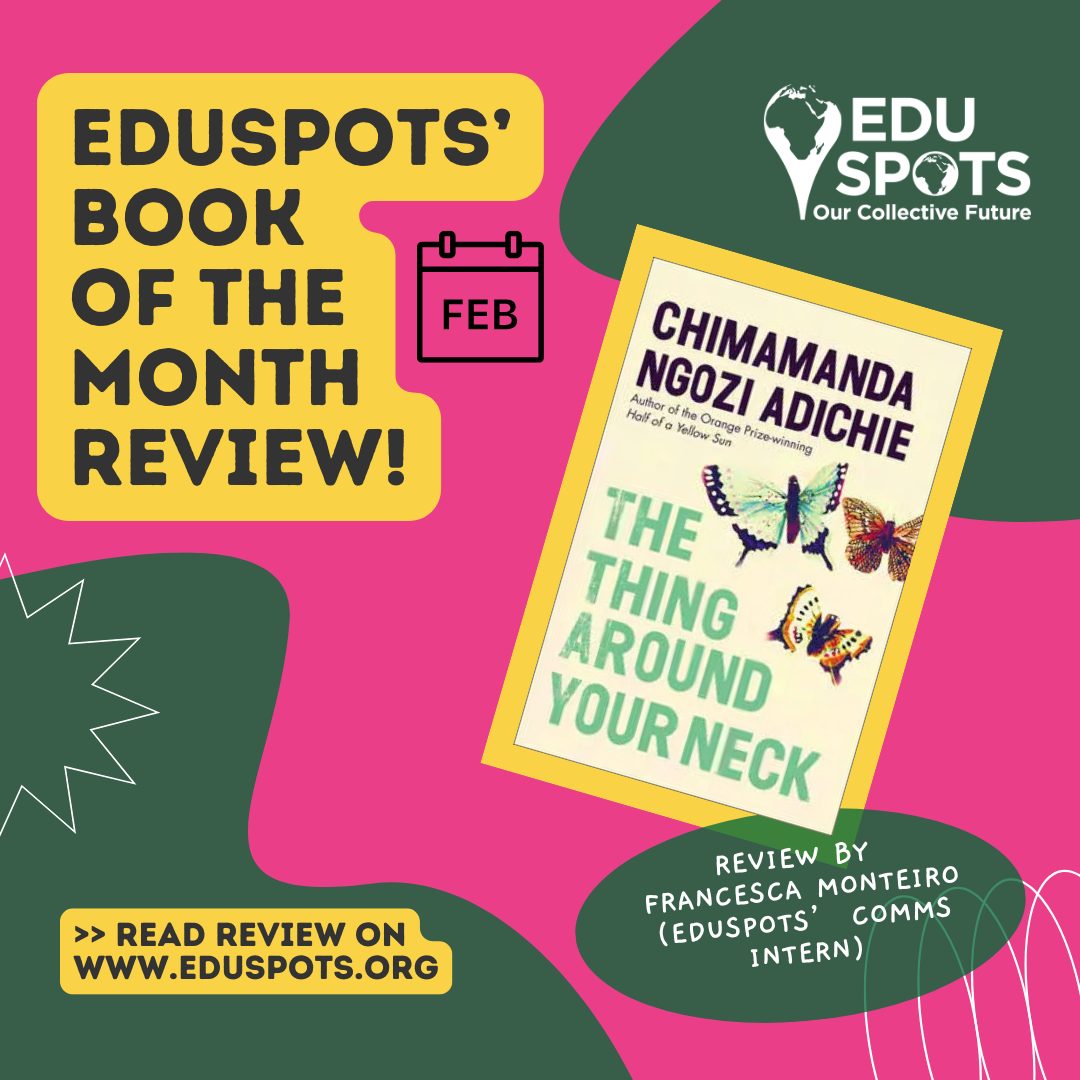Welcome back to EduSpots Book of the Month (February Edition)!
This month, we are reflecting on Chimamanda Ngozi Adichie’s powerful short story Jumping Monkey Hill. In writing this short story, Adichie outwardly criticises the demand for conformity to colonialist ideologies in African writing, which has been imposed by the West. She offers insight into how a writer’s identity supersedes the boxes of nationality, race and gender implemented by society.
Chimamanda Ngozie Adichie is a renowned writer whose anthology of short stories The Thing Around Your Neck is commended for providing a long-needed feminist account of the post-colonial Nigerian experience, with Jumping Monkey Hill implementing this in the context of writing. This short story offers a semi-autobiographical narrative of a young woman struggling against the white, male dominated agenda that overwhelms the writing industry. On a retreat in South Africa run by a British couple, the writer, Ujunwa, reveals the frustrations of not being able to tell the “correct” story in the eyes of her inherently biased audience.
Through writing short stories, Ujunwa is navigating how to manage the battles she faces against the patriarchy. By disregarding the authenticity of her experience, the reaction of the others on the retreat reflects the dismissal of institutionalised misogyny. The irony of Edward’s comment, “it isn’t a real story of real people,” when Ujunwa is in fact writing about her own experience, exacerbates how ignorant the attitudes in the writing industry are. His character epitomises the ingrained prejudice against African women in predominantly white spaces, with his transparent objectification of Ujunwa and “the Senegalese woman.” By ignoring the way he treats them, the rest of the writers enable this patriarchal system by shaming the women in order to maintain their silence. This reflects how, rather than ignorance of female oppression, the normalisation of turning a blind eye to blatant misogyny is an extremely deep-rooted issue.
Adichie has created the characters of Edward and Hillary to illustrate the precarious situation when a privileged authority projects their colonialist ideologies due to their own perceived superiority. Hillary is implied to be a perfect example of “white saviorism,” as a British woman who is an African animal rights activist. To Ujunwa, her arrogant and self-righteous nature immediately comes across. Ujunwa and her mother ridicule her for being convinced that she can identify “royal” features, when in fact she is merely oversimplifying African identities. While Adichie’s presents this in a lighthearted manner, in reality excessive arrogance in a person of authority is extremely threatening and may reinforce colonialist-adjacent prejudice. The couple further exaggerate their own self-importance from their Oxford-educated identity, a label which they employ to signify superiority. Edward, who studied African literature there, uses this identity to show that his knowledge is undoubtedly more complex and genuine than the other writers. In reality, the Westernised lens of his education likely distorts his perspective greatly, making him less capable than the African writers of maintaining “authenticity” in their narratives. These characters reveal the entitlement of white saviours and how it can be harmful when their bias leads to projection of false doctrines.
On the retreat, the writers, a group mainly composed of African women, form connections and seemingly build friendships as a result of their shared experiences. It is later established that their individual differences lead to tensions as a result of feeling misunderstood. The implementation of division within the group emphasises the value of true community, especially under oppressive circumstances. The writers on the retreat initially create a relationship, but this is soon revealed to simply be a matter of circumstance rather than true loyalty. When Ujunwa realises that the other writers chose to ignore how she was being treated, her perception of community is broken, leading to a sense of isolation and injustice. Her sense of betrayal highlights how a false sense of community can be just as harmful, if no more so than an entire absence of community. If the writers had been supportive and defended her, she would not have had to endure Edward’s misogyny alone, and likely would have been encouraged to defend herself sooner. This emphasises how powerful establishing a stable community can be, especially amongst women, to protect themselves against a threatening external authority.
In “Jumping Monkey Hill,” Adichie thoughtfully examines how external expectations can influence African writers’ ability to share their authentic experiences. This exploration aligns beautifully with EduSpots’ commitment to creating educational opportunities that honor diverse voices and perspectives. Through Ujunwa’s journey, we see the importance of fostering environments where individuals can express their genuine narratives without constraint. This resonates with EduSpots’ vision of building supportive communities where young people are empowered to develop their own understanding of the world through education. The story reminds us that meaningful learning and growth happen when we create spaces that value authentic representation and mutual respect across different backgrounds and experiences.

